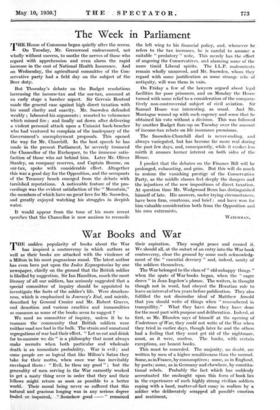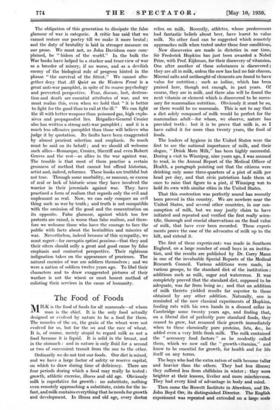War Books and War
THE sudden popularity of books about the War has inspired a controversy in which authors as well as their books are attacked with the virulence of a Milton in his most pugnacious mood. The latest author has even been put upon the Index Expurgatorius by one newspaper, chiefly on the ground that the British soldier is libelled by suggestion. Sir Ian Hamilton, much the most literary of all our .soldiers, has seriously suggested that a special committee of inquiry should be appointed to investigate the facts of the soldier's life. Were drunken- ness, which is emphasized in Journey's End, and suicide, described by General Crozier and Mr. Robert Graves, and desertion and various cruelties and immoralities as common as some of the books seem to suggest ? • We need no committee of inquiry, unless it be to reassure the community that British soldiers were neither mad nor bad in the bulk. The strain and unnatural segregations of war had their effect. "Let us eat and drink for to-morrow we die" is a philosophy that must always make recruits when both particular and wholesale death is an immediate probability. War is evil ; and some people are so logical that like Milton's Satan they take for their motto, when once war has inevitably enveloped them : "Evil, be thou my -good " ; but the generality of ' men serving in the War earnestly worked to get a nasty thing over in order that they and their fellows might return as soon as possible to a better world. Their moral being never so suffered that this natural and gracious longing was in any serious degree fouled or impaired. " Somehow good —" remained their aspiration. They sought peace and ensued it. We should all, at the outset of an entry into the War book controversy, clear the ground by some such acknowledg- ment of the "essential decency" and, indeed, sanity of the soldiers themselves.
The War belonged to the class of" old unhappy things" when the spate of War books began, when the " eagre drove" in Jean Ingelow's phrase. The writers, in thought though not in word, had obeyed the Horatian rule to leave an interval of ten years before publication. They also fulfilled the not dissimilar ideal of Matthew Arnold that you should write of things when "remembered in tranquillity." What they have done they have done for the most part with purpose and deliberation. Indeed, at first, as Mr. Blunden says of himself at the opening of Undertones of War, they could not write of the War when they tried in earlier days, though later he and the others had a feeling that they must get rid of the nightmare, must, as it were, confess. The books, with certain exception, are honest books.
This must be conceded. The majority, no doubt, are written by men of a higher sensitiveness than the normal. Some, as in France, by consumptives; some, as in England, by poets; some, as in Germany and elsewhere, by constitu- tional rebels. Probably the fact which has suddenly accentuated the onslaught upon this form of book lies in the experiences of such highly strung civilian soldiers coping with a hard, matter-of-fact essay in realism by a soldier who deliberately scrapped all possibl/ emotion and sentiment, The obligation of this generation to dissipate the false glamour of war is categoric. A critic has said that we cannot restore our poetry till we make it more brutal ; and the duty of brutality is laid in stronger measure on our prose. We must not, as John Davidson once com- plained, be "hiders . of the . world." In. the bulk the War books have helped to a starker and truer view of war as a breeder of misery, if no worse, and as a devilish enemy of the biological rule of progress hinted in the phrase "the survival of the fittest." We cannot alto- gether deny that All Quiet on the Western Front is a great anti-war pamphlet, in spite of its coarse psychology and perverted perspective. Fear, disease, lust, destruc- tion and death are essential attributes of war, and we must realize this, even when we hold that "it is better to fight for the good than to rail at the ill." We can fight the ill with better weapons than poisoned gas, high explo- sives and propagandist lies. Brigadier-General Crozier also has written a strong anti-war pamphlet ; and it is a much less offensive pamphlet than those will believe who judge it by quotation. Its faults have been exaggerated by almost prurient selection and emphasis. So much must be said on its behalf ; and we should all welcome such allies—Remarque, Crozier, Sherriff and even Robert Graves and the rest—as allies in the war against war. The trouble is that most of them practise a certain grossness of method that cannot but offend historian, artist and, indeed, reformer. These books are truthful but not true. Through some morbidity, or rancour, or excess of zeal or lack of historic sense they have involved the Warrior in their jeremiads against war. They, have practised a form of realism that regards only the evil and unpleasant as real. Now, we can only conquer an evil thing such as war by truth ; and truth is not compatible with the omission of the good and the concentration on its opposite. False glamour, against which too few protests are raised, is worse than false realism, and there- fore we welcome those who have the courage to face the public with facts about the bestialities and miseries of war. Nevertheless, indeed because of this sympathy, we must regret—for corruptiooptimi pessima—that they and their citers should sully a great and good cause by false emphasis and contorted perspective. Their righteous indignation takes on the appearance of prurience. The natural enemies of war are soldiers themselves ; and we were a nation of soldiers twelve years ago. To libel their Characters and to draw exaggerated pictures of their warfare is not the wisest or most honest method of enlisting their services in the cause of humanity.







































 Previous page
Previous page